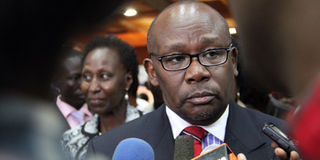This onslaught against democracy must never be allowed to succeed

Attorney General Prof. Githu Muigai addresses the press at the Kenyatta International Convention Centre in Nairobi. PHOTO : Diana Ngila
What you need to know:
- No regime in Kenya’s history has moved as quickly to restrict democratic space as the present one.
- Resistance has followed every attempt to restrict democratic space, with varying degrees of success. And every time, there has been tremendous pain and suffering for Kenyans and Kenya.
- Foreign funding affects every sector. The biggest corporations are foreign funded: From Safaricom to Kenya Breweries, Kenya Airways to Barclays Bank and Equity Bank
No regime in Kenya’s history has moved as quickly to restrict democratic space as the present one. In just eight months, a law restricting media freedom has been passed, and now there is the insidious proposal to control and finish off independent civil society.
This latter effort is ironically led by Attorney-General Githu Muigai, whose rise to fame and fortune was on the back of the same civil society he now wants to extinguish! It reminds me of the story of the man who uses a ladder to climb to the top of the tall coconut tree and then casts it away so that no one else can climb up.
But the ladder to ascend is also the same one for descending and, without it, his fall is traumatic and painful.
Jomo Kenyatta took three years to amend the constitution to force the “little general elections” to thwart the new Kenya People’s Union from having enough seats in Parliament to be an effective opposition. But this shrinking of democratic space had been foreshadowed by the assassination of Pio Gama Pinto in 1965.
It was three years before Daniel arap Moi changed the law to prohibit political parties and thereby ensure a monopoly of power which lasted 10 painful years. Mwai Kibaki tried to shrink the space three years into his rule, with the foolhardy raid on The Standard and extra-judicial executions calculated to intimidate the population.
Resistance has followed every attempt to restrict democratic space, with varying degrees of success. And every time, there has been tremendous pain and suffering for Kenyans and Kenya.
In the 1960s, shrinking democratic space led to massive corruption, massacres and assassinations within a climate of fear. With the Cold War at its peak, Kenyatta was insulated internationally but resisted nationally.
In the 1980s, we again saw a rise in corruption, torture and massacres from Wagalla to the state-instigated violence in the Rift Valley, but with international and national resistance with the end of the Cold War.
In 2008 we came close to civil war as a direct consequence of efforts to restrict democratic space — including the stealing of presidential elections.
This impulse toward total control and dictatorship will spread if it is allowed to succeed. While today it is the media and civil society under siege, it will inevitably spread to business and other sectors. That is the irresistible logic of repression and control: It never just ends with one sector.
It spreads like a cancer and woe unto those who attract envy and show they can be independent politically, socially or economically.
We live in different times now, with inter-connectedness nationally and globally, and these moves will be sharply resisted. It will be clear to people in Northern Kenya, Nyanza, Western, Coast, South Rift, and Ukambani that these attempts to control and extinguish civil society will have tremendous negative effects on them, for many would not survive without civil society and foreign funding.
It will be clear to people living with HIV/Aids that without foreign funding their lives will take a turn for the worse. And it will be clear to the marginalised and voiceless that it is these NGOs that have the guts to speak out for them and that is it the Constitution that gives them a chance and hope.
Mark you, foreign funding affects every sector. This newspaper is foreign funded, with the Aga Khan holding majority shares. The biggest corporations are foreign funded: From Safaricom to Kenya Breweries, Kenya Airways to Barclays Bank. Even Equity Bank has foreign shareholders.
And for those arguing security, note that Charter House Bank is not civil society. The Goldenberg, Anglo Leasing and maize scandals were not NGOs. In fact, it is much easier to launder funds, engage in nefarious activities and affect national security through private enterprise and the secret “client accounts” of lawyers, than through NGO
Moreover, crucially, our country is significantly foreign funded with huge external debts, tourism, exports, and substantial development aid. If we want to restrict foreign funding, let’s go the whole hog and stop this pretence.





